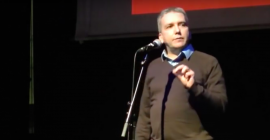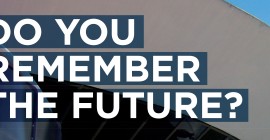Although Capitalist Realism introduced me to Mark Fisher’s writing, it was Suffering With a Smile, a short piece on the Occupied Times website, which really gripped and troubled me. I’ve come back to it time and time again. When I first read it I was a student activist trying to flesh out my developing ‘anti-work’ politics. At the time none of the ideas I grasped at were quite sating my need to articulate what I felt was quite so poisonous about a society built around the institution (or worse, the virtue) of work. ‘The reduction of subjectivity’ – no, that’s not it. ‘24/7 society’ – not quite. ‘Living for the weekend’ – I wish. In SWAS Mark seemed to be familiar with this cognitive grasping: “There are now two classes: those addicted to work, and those forced to work. But this isn’t quite accurate.” “Your misery has to be concealed… Yet that’s not quite right.” The difference is Mark always found a way to follow the thought through, to put his finger on the source of one’s perturbation. In this piece he captured the complicity we have in our own semiotic reactivation within communicative capitalism’s relentless streams, but moreover the sadism of late capitalism’s tendency to ultimately revel in our despair, despite our emotionally strained attempts to conceal it. Most recently I returned to SWAS while organising a campaign with fellow hourly-paid teachers. Locked in an affective and quantitative firefight with a hydra of bureaucracy, student satisfaction surveys and management intransigence, the themes in SWAS still resonate strongly. But Mark’s diagnosis was not individual, rather that of a collective kind: we are sick with capitalism, but the prognosis is for us to decide.
CMcV
Original article at Occupied Times
“I usually get up at 5 or 5:15am. Historically, I would start sending emails when I got up. But not everyone is on my time schedule, so I have tried to wait until 7am. Before I email, I work out, read, and use our products. … I am not a big sleeper and never have been. Life is too exciting to sleep.”
“I quickly scan my emails while my son is taking over my bed and having his milk. Urgent ones I reply to there and then. I flag others to follow up on my commute into work. . . . I receive an average of 500 emails a day, so I email throughout the day.”
These two accounts – both taken from a Guardian article entitled “What Time Do CEOs Wake Up?” – might have been designed to illustrate the theses of post-autonomist theorists such as Antonio Negri, Paolo Virno and Franco ‘Bifo’ Berardi. Labour is essentially communicative. The boundaries between work and life are permeable. The incessant demands of semio-capitalism stretch the limits of physical organisms. Email means that there is no such thing as a workplace or a working day. You start working the minute you wake up.
These descriptions of a CEO’s day also prove Deleuze and Guattari’s claim in Anti-Oedipus that, in capitalism, “there are no longer even any masters, but only slaves commanding other slaves . . . The bourgeois sets the example … : more utterly enslaved than the lowest of slaves, he is the first servant of the ravenous machine, the beast of the reproduction of capital . . . ‘I too am a slave’ – these are the new words spoken by the master. “
At the top of the tower, there is no liberation from work. There is just more work – the only difference is that you might now enjoy it (life is too exciting for sleep). For these CEOs, work is closer to an addiction than something they are forced to do. In a provisional formulation, we might want to posit a new way of construing class antagonism. There are now two classes: those addicted to work, and those forced to work. But this isn’t quite accurate. Whether we are working for our employers (who pay us) or for Mark Zuckerberg (who doesn’t), most of us find ourselves compulsively gripped by the imperatives of communicative capitalism (to check email, to update our statuses). This mode of work makes Sisyphus’s interminable labours seem quaint; at least, Sisyphus was condemned to perform the same task over and over again. Semio-capitalism is more like confronting the mythical hydra: cut off one head and three more grow in its place, the more emails we answer, the more we receive in return.
The good old days of exploitation, where the boss was interested in the worker only to the extent that they produced a commodity which could be sold at a profit, are long gone. Work then meant the annihilation of subjectivity, your reduction to an impersonal machine-part; it was the price that you paid for time away from work. Now, there is no time away from work, and work is not opposed to subjectivity. All time is entrepreneurial time because we are the commodities, so that any time not spent selling ourselves is wasted time. Hence, like the characters in the film Limitless, we’re always seeking ways to increase the time available to us – via intoxicants, cutting back on sleep, working while we commute … The unemployed do not escape this condition – the simulation tasks that they are now induced to perform in order to qualify for benefit are more than preparations for the futility of paid work, they are already work (for what is so much ‘real’ work if not an act of simulation? You don’t just have to work, you have to be seen working, even when there’s no ‘work’ to do …)
Being exploited is no longer enough. The nature of labour now is such that almost anyone, no matter how menial their position, is required to be seen (over)investing in their work. What we are forced into is not merely work, in the old sense of undertaking an activity we don’t want to perform; no, now we are forced to act as if we want to work. Even if we want to work in a burger franchise, we have to prove that, like reality TV contestants, we really want it. The notorious shift towards affective labour in the Global North means that it is no longer possible to just turn up at work and be miserable. Your misery has to be concealed – who wants to listen to a depressed call centre worker, to be served by a sad waiter, or be taught by an unhappy lecturer?
Yet that’s not quite right. The subjugatory libidinal forces that draw enjoyment from the current cult of work don’t want us to entirely conceal our misery. For what enjoyment is there to be had from exploiting a worker who actually delights in their work? In his sequel to Blade Runner, The Edge of Human, K W Jeter provides an insight into the libidinal economics of work and suffering. One of the novel’s characters answers the question of why, in Blade Runner‘s future world, the Tyrell Corporation bothered developing replicants (androids constructed so that only experts can distinguish them from humans). “Why should the off-world colonists want troublesome, humanlike slaves rather than nice, efficient machines? It’s simple. Machines don’t suffer. They aren’t capable of it. A machine doesn’t know when it’s being raped. There’s no power relationship between you and a machine. … For the replicant to suffer, to give its owners that whole master-slave energy, it has to have emotions. … . The replicant’s emotions aren’t a design flaw. The Tyrell Corporation put them there. Because that’s what our customers wanted.”
The reason that it’s so easy to whip up loathing for “benefit scroungers” is that – in the reactionary fantasy – they have escaped the suffering to which those in work have to submit. This fantasy tells its own story: the hatred for benefits claimants is really about how much people hate their own work. Others should suffer as we do: the slogan of a negative solidarity that cannot imagine any escape from the immiseration of work.
To understand work now, consider the pornographic practice of bukkake. Here, men ejaculate in women’s faces, and the women are required to act as if they enjoy it, to lasciviously lick the semen from their lips as if it is the most delicious honey. What’s being elicited from the women is an act of simulation. The humiliation is not adequate unless they are seen to be performing an enjoyment they don’t actually feel. Paradoxically, however, the subjugation is only complete if there are some traces of resistance. A happy smile, ritualised submission; this is nothing unless signs of misery can also be detected in the eyes.
By Mark Fisher | @kpunk99









